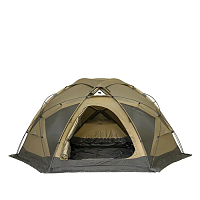Cart
What is the average weight of a backpacking tent?
What is the average weight of a backpacking tent?
If you are planning a backpacking adventure, one of the most crucial factors to consider is the weight of your gear. A backpacking tent plays a significant role in determining the overall weight you will be carrying. So, what is a reasonable expectation for the average weight of a backpacking tent?
Factors influencing the weight of a tent
Multiple factors influence the weight of a backpacking tent. These include the materials used, the number of occupants it can accommodate, the seasonality it is designed for, and additional features such as vestibules or rainflies. Let's take a closer look at how these factors can affect the average weight.
Materials used
The materials used in the construction of a backpacking tent can have a significant impact on its weight. Traditional tents made from heavier materials like canvas or polyester tend to be bulkier and weigh more. However, modern backpacking tents are designed using lightweight, durable materials such as nylon or polyester blends. These materials help reduce the weight of the tent without compromising on quality or durability.
Capacity
The number of people a tent can accommodate also affects its weight. A backpacking tent designed for solo use will obviously be lighter than a tent designed for two or more people. Tent manufacturers often provide individual specifications for both one-person and multiple-person tents, allowing backpackers to choose based on their specific needs.
Seasonality
The seasonality a tent is designed for can impact its weight as well. Backpacking tents are categorized into three main types: three-season, four-season, and ultralight. Three-season tents are suitable for spring, summer, and fall, while four-season tents are designed to withstand harsh winter conditions. Ultralight tents are specifically designed to minimize weight and are ideal for hikers aiming to further reduce their load. Depending on the season you plan to camp in, the weight of the tent can vary significantly.
Additional features
Tents often come with additional features like vestibules, rainflies, or mesh panels for ventilation. While these features enhance the comfort and functionality of the tent, they can also add to its weight. Each additional feature should be evaluated in terms of its importance to your camping experience and whether the added weight is worth the benefits it provides.
The average weight range
Considering these factors, the average weight of a backpacking tent typically ranges from 2 to 5 pounds (0.9 to 2.3 kilograms). This weight range is for a standard two-person three-season backpacking tent. Smaller solo tents or ultralight options can weigh as little as 1 pound (0.45 kilograms), while larger four-season tents may exceed 8 pounds (3.6 kilograms).
Conclusion
When selecting a backpacking tent, it is essential to strike a balance between weight and functionality. Consider your specific needs, seasonality, and the expected weather conditions to choose a tent with an appropriate weight range. Remember, a lightweight tent can make your backpacking adventures more enjoyable and less strenuous.
- Contact Us
-

About Pomoly
Pomoly is a leading camping brand specializing in hot tents and tent stoves. We are camping life explorer, Follow Page / Join Group, let's make camping enjoyful together!
Working Hours
Mon-Fri, 09:00 - 17:00

- Company Info
- NEWS
- About us
- Pomoly Name
- Leave-No-Trace
- Contact Now
- Facebook Group
- YouTube Learning
- Product News
- Contact Us
- Topic Collections
- Policies & Terms
- Payment Policy
- Shipping Policy
- Return & Refund
- Privacy Policy
- Terms of Use
- Tax Policy
- Website Disclaimer
- Safety Disclaimer
- Warranty Policy
- Promotion Policy
- Pre-order Policy
- INTELLECTUAL PROPERTY RIGHTS
- Dealers Agreement And Terms
- Become Affiliate
- User Center
- Forget Password
- My Orders
- Tracking Order
- My Account
- Register
- Popular Searches
-
Tipi Tents Dome Tents Camping Tent Hammock Stove Camping Camping Pellet Stove Circle 6 Titanium Water TankDome X Locomotive 20 LEO 2 camping tent T-Brick 2.0 T1 2.0 tent stove Dweller wood stove Oroqen 2.0 Chimney Water Tank Lumberjack STOVEHUT Bromance 70 Tipi Pomoly Coupon Baker Oven Stove Titanium elbow Fire Pits Tent Stove titanium Stove Outdoor Pellet Stove
keebon pellet stove






